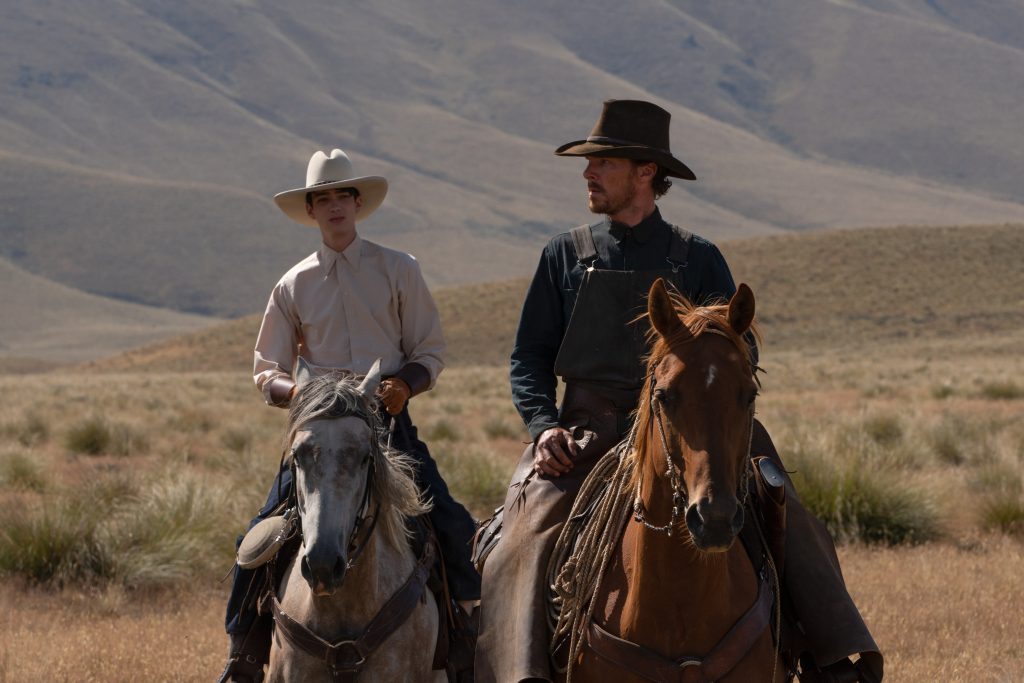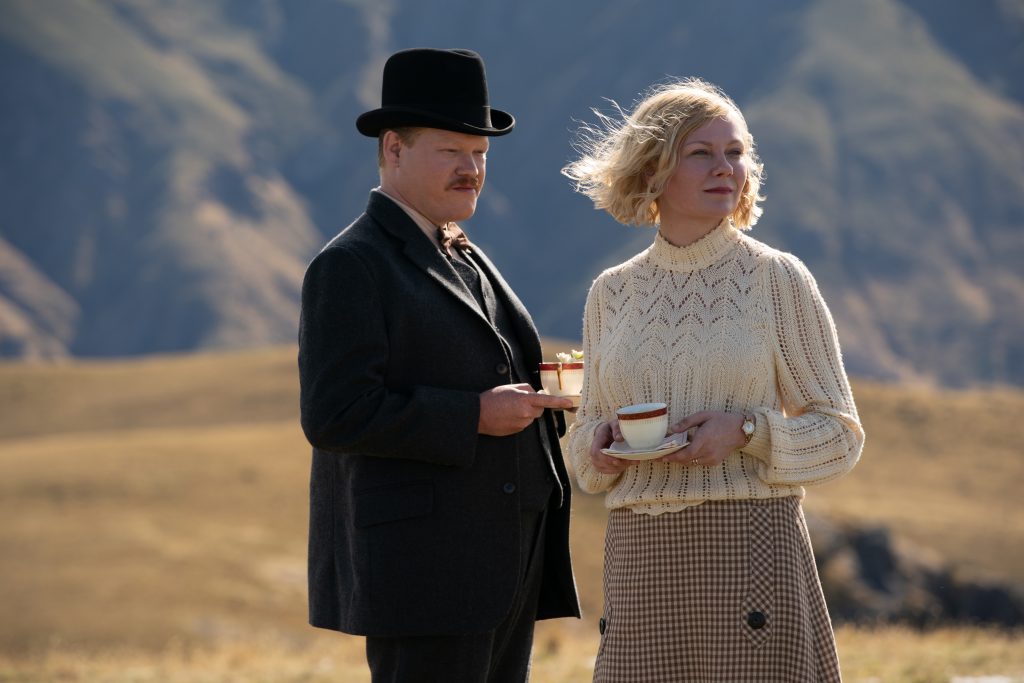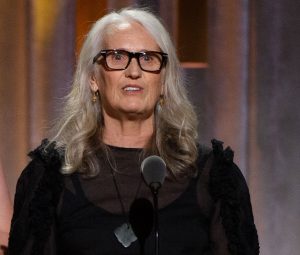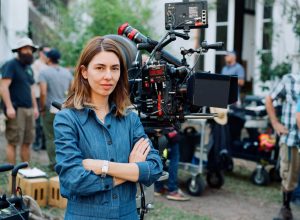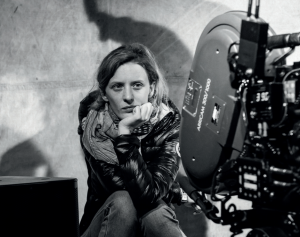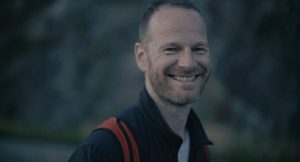January 30, 2023
by Carla Hay
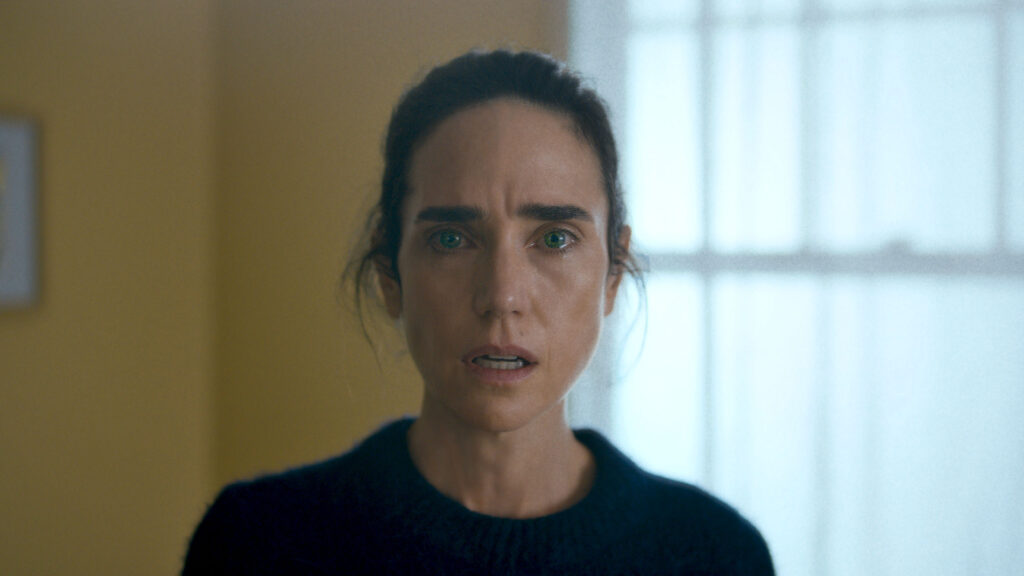
Directed by Alice Englert
Culture Representation: Taking place in Oregon and in New Zealand, the comedy/drama film “Bad Behaviour” features a predominantly white cast of characters (with a few black people and Asians) representing the working-class, middle-class and wealthy.
Culture Clash: A depressed actress, who used to be famous when she was a teenager, goes to a therapeutic retreat, and she experiences odd situations while trying to mend her strained relationship with her adult daughter, who is working in New Zealand as a movie stunt performer.
Culture Audience: “Bad Behaviour” will appeal primarily to people who are fans of star Jennifer Connelly and pointless and dull movies where self-absorbed people are obnoxious.
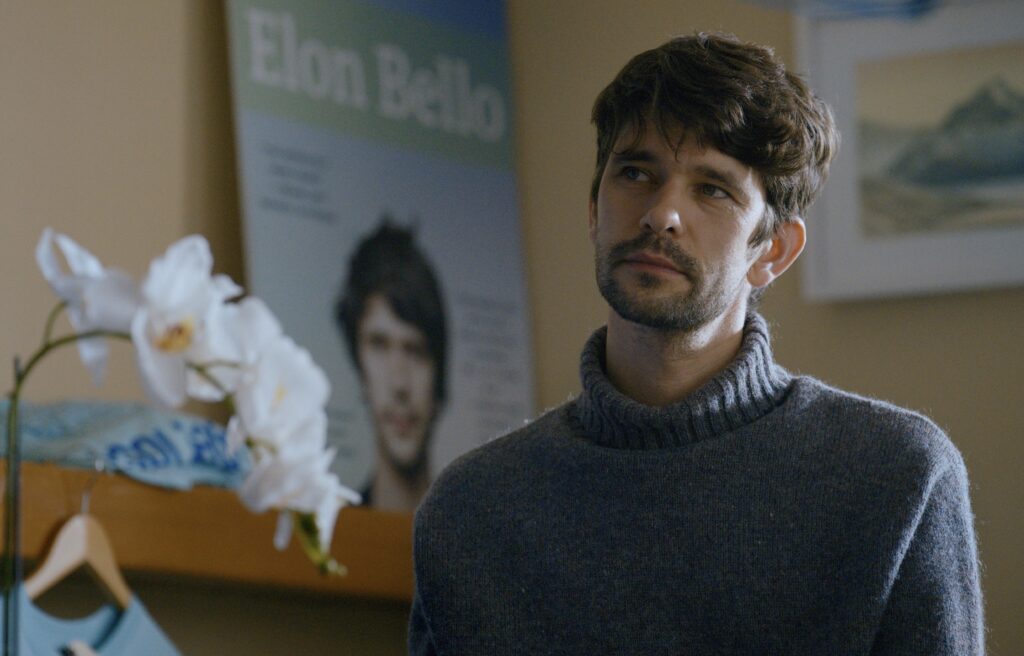
Observational comedies about self-pitying, privileged neurotics can be amusing if done with some clever self-awareness. “Bad Behaviour” tries too hard to be cutesy and dark, with no wit involved. It all adds up to being an irritating, self-indulgent mess. “Bad Behaviour” had its world premiere at the 2023 Sundance Film Festival. It’s yet another movie about someone who goes on a “getaway trip” to try to find some relief from personal problems, and the person finds out that running away from these problems isn’t the answer.
“Bad Behaviour” is the feature-film directorial debut of Alice Englert, who also wrote the movie. Englert is best known as an actress, with roles in such films as 2012’s “Ginger & Rosa” and 2019’s “Them That Follow,” as well as TV series such as 2016’s “Top of the Lake,” 2020’s “Ratched” and 2022’s “Dangerous Liaisons.” Englert also happens to be the daughter of Oscar-winning director Jane Campion. This family connection is worth noting because Campion makes a cameo in “Bad Behaviour” as an unnamed doctor, while Englert has an acting role Campion’s 2021 film “The Power of the Dog.”
In “Bad Behaviour,” Jennifer Connelly portrays Lucy, a depressed actress who is going to a therapuetic retreat in Oregon at a place called Loveland Ranch. While driving by herself to this retreat, Lucy calls her daughter Dylan (played by Englert), a stunt performer who is in her 20s and is currently in New Zealand on the set of a sci-fi action movie. A lot of the movie’s action scenes take place in a wooded area. (“Bad Behaviour” was actually filmed in New Zealand.)
The phone conversation between Lucy and Dylan is brief, because Dylan’s phone service isn’t very good in these woods. However, they are on the phone long enough for Lucy to tell Dylan that Lucy is going on a “semi-silent retreat in the wildnerness, so don’t expect to hear from me.” Dylan is very indifferent and doesn’t seem very interested in talking on the phone with her mother. Before their phone connection get cut off, Dylan tells Lucy that Dylan is at work. “I have to teach a guy to strangle me,” Dylan says in a distracted tone.
When Lucy arrives at Loveland Ranch (which is in a semi-isolated wooded location), she’s told by the receptionist Petunia (played by Ana Scotney) that there is no WiFi service outside of the reception area. The retreat participants are also discouraged from using their cell phones, because cell phones are considered to be distracting for this retreat. Petunia also says that the people on this retreat are being filmed for a documentary. It’s the first sign that this so-called “private” retreat has a lot of contradictory things about it. It’s partially because this retreat is like a very bad, unfunny joke, and partially because the writing for this movie is so sloppy.
Lucy is surprised to hear that the therapy sessions will be filmed. And so, Lucy tells Petunia that she doesn’t want to be filmed when she’s revealing personal information during these sessions. Petunia accepts this request from Lucy and says that Lucy can just tell the camera operator Mark (played by Thomas Sainsbury) when Lucy does not feel comfortable being filmed, and Mark will stop filming Lucy. All of this doesn’t matter in the end, because viewers will see later in the movie that Lucy eventually forgets that the cameras are there.
Everything about Loveland Ranch reeks of being pretentious, pricey, and aimed at gullible people who are desperate for emotional comfort. The retreat is led by a famous guru named Elon Bello (played by Ben Whishaw), a Brit whose therapy credentials are never mentioned, probably because he doesn’t have any legitimate therapy credentials. There are about 10 participants in the therapy sessions that take place in “Bad Behaviour,” with each therapy session becoming more and more annoying to watch.
This is the type of nonsense that Elon spouts when greeting the therapy participants: “I invite you to begin this time with yourselves, without the stories that drove you here … I invite us to be quiet, to give yourself permission to be a little mysterious … I encourage you not to smile at each other, no winking, so signing. You can use the [writing] board, or come to me or Petunia if you’re feeling panic, of course.”
The problem with Elon’s instructions is that he constantly contradicts them, thereby giving the therapy sessions a rambling and unfocused tone—much like how Englert directs this movie. For a so-called “semi-silent” retreat, people sure do a lot of talking about themselves and their sob stories, and they make a lot of noise. In one therapy session, the participants are paired up for role playing, with one person in the pair acting as a sad baby, while the other person is acting as a nurturing mother.
At first, Lucy is emotionally closed-off and doesn’t want to reveal too much of herself. Eventually, she is told that she has to fully open up about herself to the rest of the group, which is a direct contradiction to Elon saying earlier, “I give you permission to be a little bit mysterious.”
It’s how viewers find out that Lucy is a “has-been” actress whose fame peaked when she was a teenager. Her main claim to fame was starring as a “warrior princess” in a TV series called “Florida Fierce.” She also has a long history of depression, stemming from her unhappy childhood being raised by alcoholic parents, who also had a history of depression.
In a “confession session,” the participants are told to confess the biggest thing that makes them feel ashamed about themselves. Lucy says she’s ashamed that “I’m just a greedy, needy, lazy, paranoid human being, living off the money I made from the character that gave me an eating disorder.” Elon irresponsibly makes no effort to find out from Lucy how this eating disorder is affecting her now.
During a break from the sessions, Lucy sneaks outside in the back of the building to use her phone to text an unidentified person. This person advises Lucy that she needs to “purge” her emotional baggage at this retreat. The text conversation also includes some other information about Lucy’s life that can only be seen if viewers are able to pause the screen and read these text messages.
This information includes the fact that Lucy’s mother was suicidal. When Lucy was 17, Lucy used to date a friend of her father. This “friend” gave herpes to Lucy. Later in Lucy’s life, Lucy’s ex-husband Ralph, who is Dylan’s father, left Lucy and Dylan. These are all important details of Lucy’s background that can explain why Lucy feels depressed and damaged, but “Bad Behaviour” only touches on the suicidal tendencies of Lucy’s mother. It’s a missed opportunity to explore other aspects of Lucy’s life that led her to this point.
Instead, “Bad Behaviour” goes on an off-putting tangent where Lucy and another retreat participant get into an unspoken competition about who’s going to get the most sympathy in these therapy sessions. Lucy’s rival to be the Loveland Ranch queen of neuroses is a fashion model in her 20s named Beverly (played by Dasha Nekrasova), who soon tells everyone at the retreat that she has suicidal thoughts. “I like to write suicide notes, and I fantasize about my funeral,” says Beverly. “I’d rather be dead. That’s my shame.”
In response, Elon says to Beverly: “You are at an airport right now. You know your flight will crash. Do not get on it.” He adds with a smirk: “Although sometimes, crashing has its benefits.” This comment is meant to be part of the the dark comedy of “Bad Behaviour,” but it’s all just so lackluster, despite having the very talented Whishaw in this role of a flaky guru.
At first, Lucy tries to be friendly to Beverly, but Lucy loses interest when Beverly acts haughty and superior to Lucy. For example, during a break from the therapy, Beverly asks Lucy to take photos of Beverly on Beverly’s cell phone, so that Beverly can post the photos on Beverly’s social media. The two women then low-key bicker about the proper lighting and how Beverly poses for these pictures.
Lucy and Beverly then take their hostility to each other into the therapy sessions. They trade thinly veiled insults related to their respective ages. When Beverly confesses that she’s worried about losing her “currency” of youth and beauty when she gets older, Lucy snarkily says that it’s inevitable. Meanwhile, Beverly makes snide remarks to make Lucy feel like a washed-up old hag.
It’s unfortunate that with all the ways that this movie’s plot could have gone, it devolves into a tiresome and lazy cliché of two women who are jealous of each other and get catty about it. Something happens later in the movie between Beverly and Lucy that takes this already jumbled and unappealing movie to the point of no return in ridiculousness. “Bad Behaviour” is trying desperately to be an artsy dark comedy, but too many aspects of this dreadful film look like ripoff ideas from a semi-scripted and tacky reality show.
In addition, “Bad Behaviour” awkwardly meshes the concurrent storylines of Lucy and Dylan. Most of “Bad Behaviour” goes back and forth between showing Lucy at the Loveland Ranch in Oregon, and Dylan on the movie set in New Zealand. Dylan’s activities are even more tedious and less insightful into her personality than what is shown about Lucy. Occasionally, Lucy and Dylan are seen talking to each other on the phone while they are so far away from each other.
There are too many scenes of Dylan running, fighting, and jumping around the movie set in visual effects costumes, with no real point to these scenes. She’s training another stunt performer named Dion (played by Beulah Koale) during the filming of this movie. There’s some sexual attraction between Dion and Dylan. And you can easily predict the rest.
“Bad Behaviour” brings up too many questions that it never bothers to answer. Sure, viewers know that Dylan has a lot of resentment toward Lucy, but the movie offers very little explanation for what their mother/daughter relationship was like before the events in the movie take place. The cast members’ performances aren’t bad, but they’re not that special either. The best acting in the movie comes from Connelly, who delivers some convincing-looking emotions in the scenes where she has to show those emotions.
However, the dialogue and tone of “Bad Behaviour” are just a confused mishmash, since Englert can’t quite capably juggle the movie’s intended combination of comedy and drama. The character of Elon is very shallow, as are all the people at the retreat. The movie spends so much of its focus on the “Lucy verses Beverly” storyline, it’s to the detriment of character development. Karan Gill has a very clumsily written role as a young attorney named Leonard “Leo” Gow, who becomes part of the story in the last third of the movie.
“Bad Behaviour” isn’t the worst movie you could ever see. The cinematography, especally in the outdoor scenes, can be quite eye-catching. However, considering the talent in this movie’s cast, “Bad Behaviour” should have been a lot better than the monotonous and aimless slog that it is. There’s an attempt to “shake things up” with a sudden turn of events, but everything about it looks phony and out-of-touch. “Bad Behaviour” is like a misguided therapy session that tries to look it might have some purpose, but it ends up doing more things wrong than right, and it becomes a waste of everyone’s time.
UPDATE: Ahi Films will release “Bad Behaviour” in New Zealand cinemas on November 2, 2023, and in Australian cinemas on November 9, 2023. Gravitas Ventures will release “Bad Behaviour” in select U.S. cinemas, digital and VOD on June 14, 2024.

